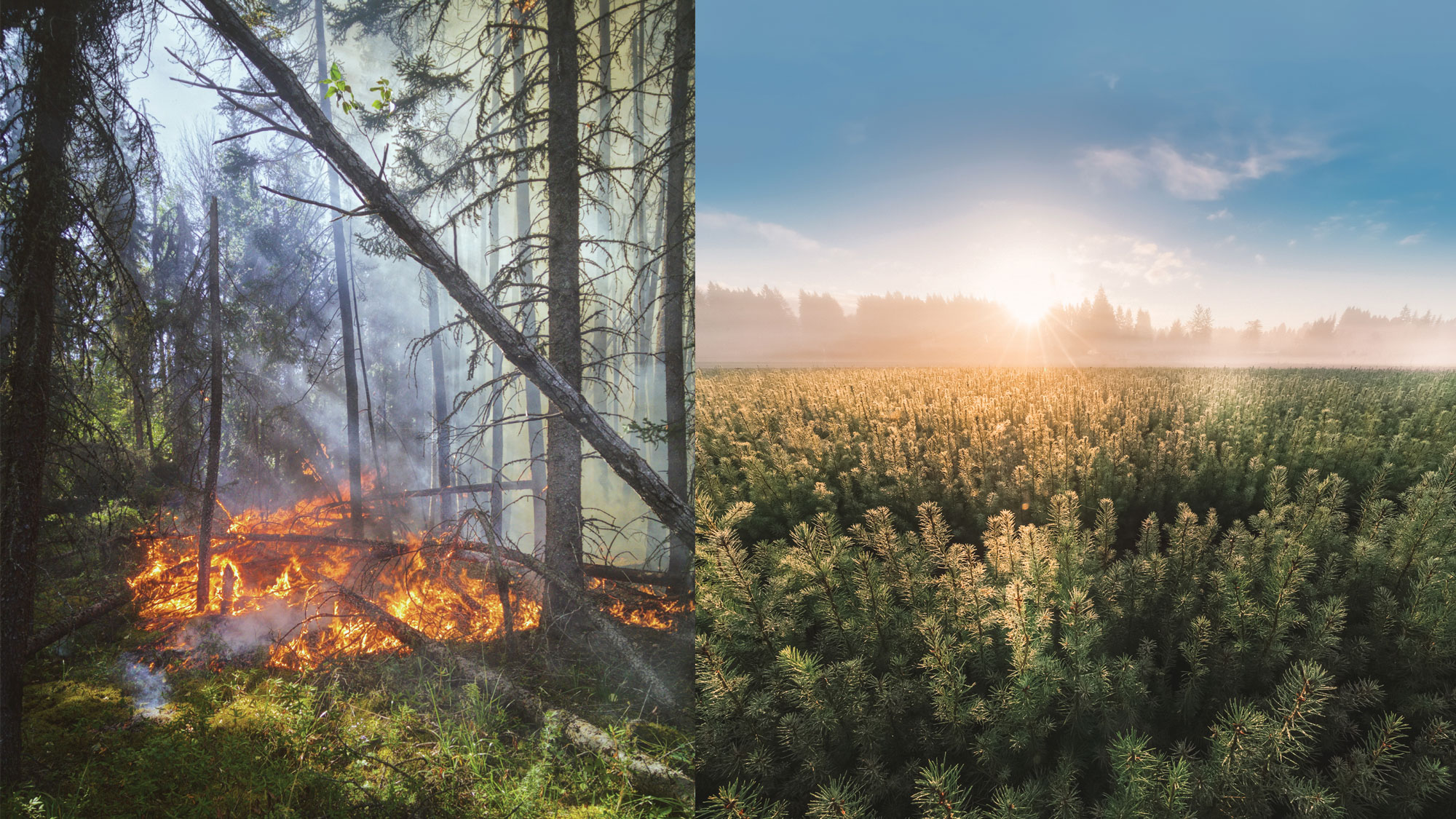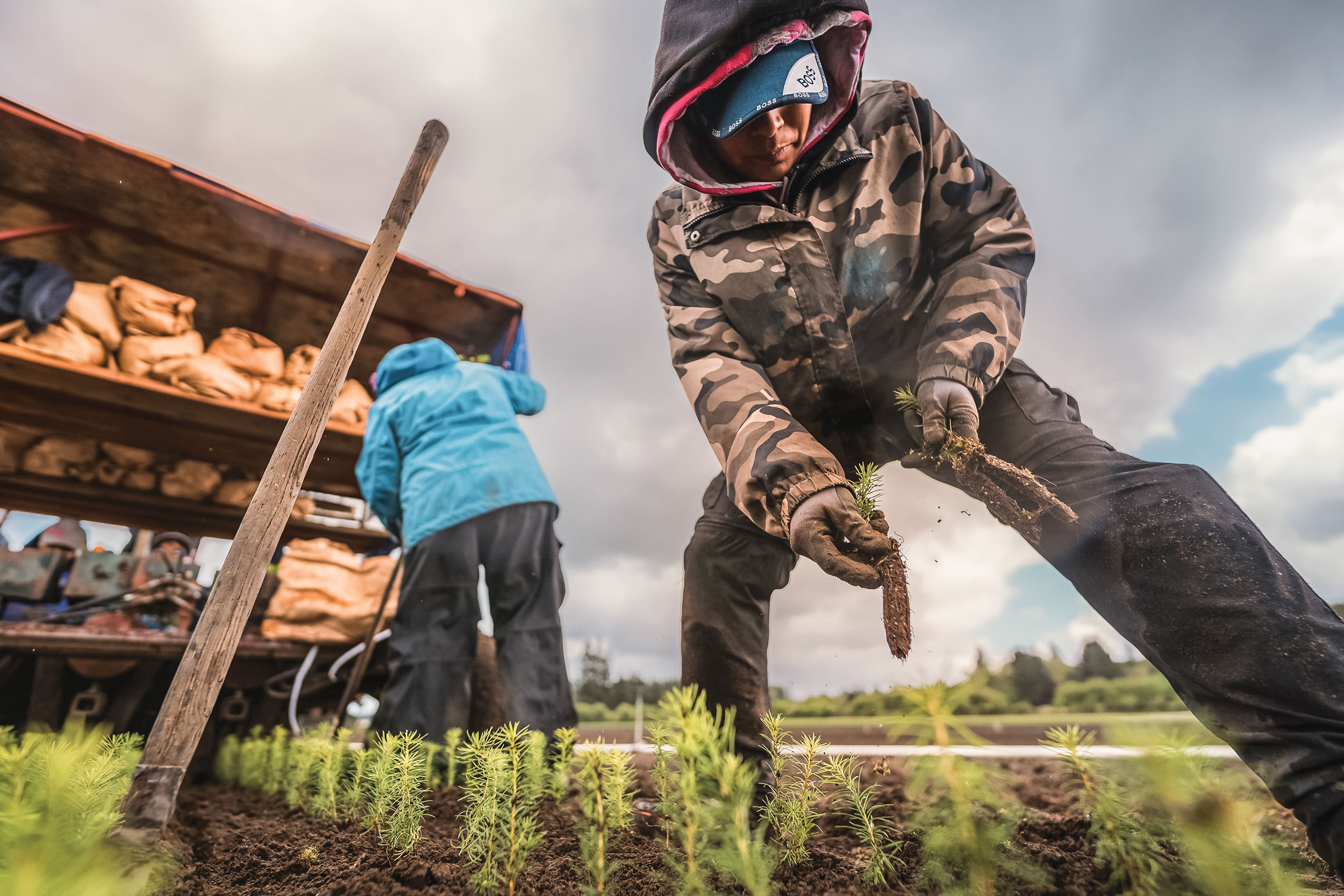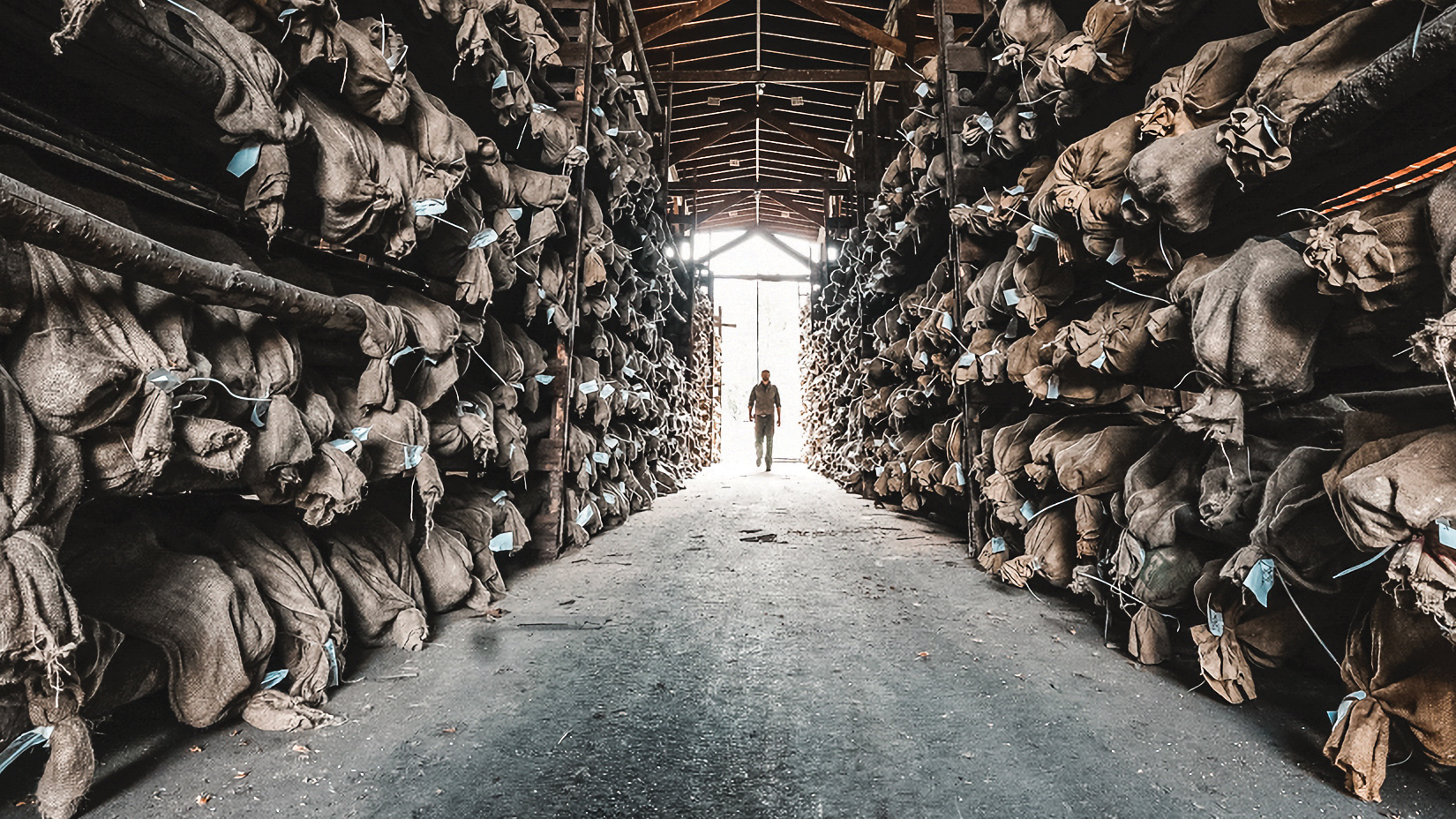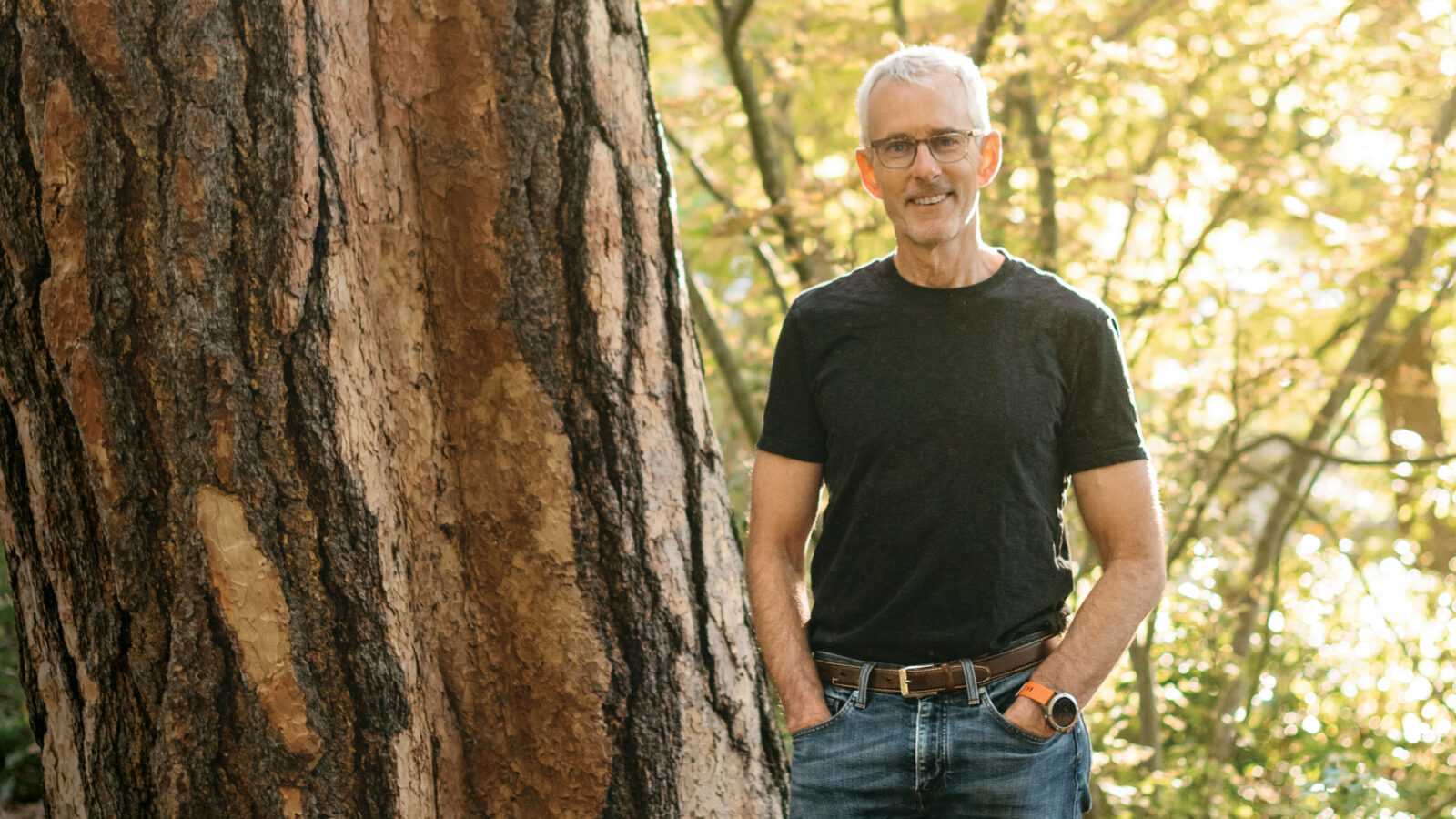Innovative financier Woolsey McKernon ’85 uses carbon credits to replant forests devastated by wildfires
Say you are the unfortunate owner of forested land that has just been incinerated by wildfire, an all-too-common event in today’s climate-contorted world. Until recently, you had three options:
1. Do nothing and watch invasive brush take over, increasing the risk of another fire in the future;
2. Replant your land with timber, at considerable expense, and wait decades for a return on your investment; or
3. Sell the burned property and take roughly a 50 percent loss, if you can get it.

“Can you make money reforesting post wildfire? Yes, you can. It makes sense for the landowner. It makes sense for our venture investors…and, it’s a win for the rural communities we operate in and, most importantly, the environment.”
Woolsey McKernon ’85 and his colleagues at Mast Reforestation want you to know you now have a fourth option: Let his Seattle-based startup restore your property back to a thriving native forest. Using their proprietary technologies and control of the supply chain, they’ll move quickly to assess and prepare your site, send in teams to replant the land with custom-grown resilient native seedlings, and then closely monitor your new forest’s growth. The clincher: There’s no cost to you. You just have to agree to keep the land as a forest for at least the next 100 years.
How can Mast Reforestation pull this off? That’s where McKernon comes in. A climate tech professional who specializes in steering investment dollars to environmental solutions, he has built a career finding creative ways to finance green innovations. Today, as Chief Revenue Officer and Head of Capital Markets for Mast, he is tapping the power of the carbon credit market, the voluntary system whereby corporations purchase credits to help them achieve their carbon-neutrality goals and meet other regulatory standards. Mast’s corporate clients pay to secure the carbon locked up in your future trees; that money in turn funds Mast’s reforestation work and provides landowners like you with a tidy payoff, a return that Mast says will exceed your other options.
It’s a win-win business model that is resonating with both landowners and the climate investment world. Since its founding in 2016 (originally as DroneSeed, an aerial tree-seeding company), Mast has raised $36 million through a Series A fundraising round, with a Series B in the works. Investors include firms such as Alexis Ohanian’s Seven Seven Six, Social Capital, DBL Partners, and Marc Benioff’s TIME Ventures. More recently, McKernon, who joined Mast in 2022, secured a first-of-its-kind, $15 million financing deal with Carbon Streaming Corp., a publicly listed Canadian company, to support reforestation. Clients that have purchased carbon credits include the e-commerce company Shopify, which bought $1 million worth in 2022.

Workers harvest native tree seedlings from the fields at Silvaseed nursery, in preparation for transplanting them in fire-damaged forests.
With the influx of venture capital, Mast acquired the venerable tree-seed supplier Silvaseed Company in 2021 and seedling grower Cal Forest Nurseries in 2022, making it now the largest seed bank in the western United States and a vertically integrated one-stop shop for landowners. Still early in its evolution, the company to date has replanted 5,000 acres, including the 300-acre Henry Creek forest in western Oregon in 2022 and Montana’s Sheep Creek Ranch (see companion article, page 31). But McKernon is optimistic that the company’s comprehensive approach—referred to as “reforestation-as-a-service”—is ready for broader application.
“Can you make money reforesting post wildfire? Yes, you can,” he says. “It makes sense for the landowner. It makes sense for our venture investors. It makes sense for Wall Street investing in these projects. And, it’s a win for the rural communities we operate in,and, most importantly, the environment. So it’s the entire continuum. And, honestly, I absolutely love it.”
Born in Connecticut, McKernon was a teenager when his family moved to Vermont, where his father served as Business Manager for the independent Mountain School, a hands-on, back-to-the-land academy in Vershire. Before transferring to Williston, McKernon attended the school for ninth grade, an experience that introduced him to the ecological thinking that would inform his professional career. But it was at Williston, he says, that he acquired the interpersonal skills that have proved crucial to his success as a manager and business leader. As a member of the hockey, soccer, ski, and lacrosse teams, he learned teamwork, he says, while living as a boarder taught him self-reliance. However, it was navigating the school’s diverse community and socializing with all types of people, he says, that have proven most valuable.
“How am I a successful sales leader? How have I been so successful at raising capital against innovative solutions to mitigate climate change?” he says. “Someone’s got an idea—I stack all the people and capital around it. Where did I get those skills? Dealing with our little community in my little dormitory, way back when. Those are foundational skills, and I definitely thank the school for that.”
After Williston, McKernon attended the University of Vermont, graduating with a bachelor’s degree in political science and minors in English and Spanish. In 2006, married and with two young sons, he moved his family to Singapore, where he worked for investment firms and earned an MSc in environmental management from the National University of Singapore. His thesis focused on leveraging private capital to bring green innovation to the built environment, and for the next 15 years he did just that, creatively financing sustainable innovation in the real estate and building industries.

Inside Silvaseed’s drying barn, where harvested pine cones and their seeds are stored before processing and planting.
He was particularly successful in his use of a then-obscure financial instrument known as Property Assessed Clean Energy (PACE) loans, which provide property owners with low-cost financing for sustainability improvements. While at California-based CleanFund, he brought new attention to the PACE option by securing a groundbreaking $500 million deal with Barry Sternlicht’s private equity firm Starwood Capital to green commercial properties. Today, as society and the business world consider what role carbon credits should play in countering climate change, McKernon hopes to repeat that earlier success at Mast. “I joined the business here to do the same thing,” he says. “Take an esoteric asset class and make it investment grade. That includes building the sales engine to ensure there’s a pipeline to consume the capital.”
His efforts could not come at a more crucial time. Now living in Ashland, Oregon, with his wife and two teenage sons, McKernon knows firsthand the devastation of wildfires, and the heartbreak of rural communities struggling to recover in their aftermath. Experts may cite various factors contributing to our current wildfire epidemic—past forest-management practices, human encroachment on forest lands, and, of course, global warming—but the importance of reforestation is undisputed. Fires burn hotter than ever before, McKernon notes, incinerating all of the seed in the tree canopy and soil, contributing to a steady decline in the ability of forests to regenerate naturally.
“Human intervention is required, and it’s required at a scale that’s unprecedented,” says McKernon, noting that in contrast to other industries that have benefitted from investment in innovation, the forestry industry remains woefully under-resourced despite the increasing need. Boosted by climate investors, new technology, and the carbon market, McKernon hopes to lead a private-sector response to an ecological crisis that is demanding new approaches.
“I need to raise and deploy billions of dollars into this business, and I need to do it yesterday,” he says. “Two nights ago, just south of me, there were 400 lightning strikes. Now there are close to 40 fires burning, just like that. The thing that compels us to act is the scale of forest fires, burning in essence the size of New Jersey in a year. We have to intervene in those landscapes, or forests will be gone and we’ll have a savannah across the western U.S.”

Some 3,000 acres of Don Harland’s Sheep Creek Ranch are being replanted by Mast Reforestation
Restoring Montana’s Sheep Creek Ranch
Sparked by a lightning strike just south of Cascade, Montana, on July 23, 2021, the Harris Mountain fire incinerated 32,000 acres of scenic wilderness and wildlife habitat, including 4,500 acres of the Harland family’s 5,200-acre Sheep Creek Ranch. Owner Don Harland wanted to replant the land for his grandchildren and for the animals that depended on it: elk, deer, bear, and bighorn sheep, among others. He turned for help to forester Zach Bashoor, who in turn enlisted Mast Reforestation. The project has become the state’s first private land reforestation, and a demonstration of Mast’s innovative business model: using carbon credits, and the latest forestry technology, to replant native woodlands at no cost to the Harlands.
Funded by public grants as well as Mast’s carbon credit sales, some 3,000 acres will be replanted with more than a million of Mast’s own “FirePlug” seedlings. The company collects fire- and drought-tolerant seeds, often from the area of a fire, then grows them in its tree nurseries, creating a vertical supply chain that avoids the seedling bottlenecks that have hampered other reforestation efforts. Unlike the dense monoculture forests planted for timber, Sheep Creek will be a mix of native lodgepole pine, ponderosa pine, and Douglas fir. “We are trying to create a diverse natural ecosystem with a variety of species,” explains Mast’s Woolsey McKernon ’85. “This is really all about creating a forest ecosystem that is going to be resilient and able to withstand the next fire that sweeps through.”
Hand-planting the seedlings will take crews three years, after which the young trees’ growth will be monitored and managed as a way to ensure investors that they are indeed capturing carbon. Under the terms of Mast’s agreements, the land will remain a forest for the next 100 years. “Communities face huge barriers to reforesting,” the company notes. “Without our combination of services, reforestation and ongoing management wouldn’t have been feasible for Don and his family.”

